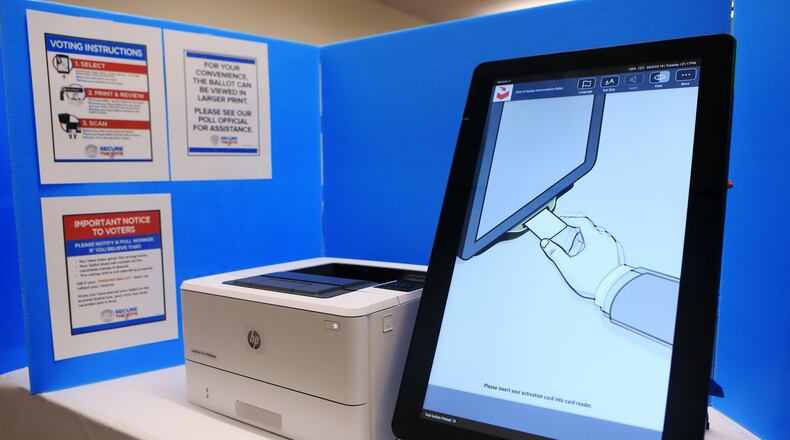The presidential election roars into Georgia with a jam-packed week in politics.
Early voting begins Monday with the statewide rollout of new voting machines. Also starting Monday, every Georgia candidate for state or federal office must fill out paperwork to qualify to run.
And the Super Tuesday presidential primaries in 14 other states will shape the field of candidates for Georgia’s election later this month.
Here’s a look at what to expect this week:
Early voting
In-person early voting for the presidential primary starts Monday in each of the state's 159 counties. All voters can cast ballots during three weeks of advance voting leading up to Election Day on March 24.
The start of early voting will bring a major test for Georgia’s new $104 million voting system, which combines electronic voting with a printed-out paper ballot. Georgia voters have lacked a paper ballot since 2002.
Voters will make their choices on familiar touchscreens, which will display 12 candidates on Democratic Party ballots and one candidate — President Donald Trump — on Republican Party ballots. Sample ballots and polling locations are available online at mvp.sos.ga.gov.
The touchscreens are attached to printers that create a paper ballot. Voters can then review their choices before walking to a scanning machine and inserting their ballots for tabulation.
Election officials say they’re prepared for the launch of the voting system, but problems could arise with new equipment. During test elections, voter check-in tablets didn’t always load correctly, voting touchscreens rebooted and ballot scanners initially wouldn’t accept some paper ballots.
Secretary of State Brad Raffensperger has said most of the problems have been corrected through poll worker training.
Qualifying
The Georgia Statehouse is already a hive of activity with lawmakers in the middle of a tense legislative session. But it’s about to take on a circuslike atmosphere with a week of qualifying set to begin Monday.
Over the next five days, hundreds of candidates will line up to fill out paperwork and pay fees to run for Georgia’s two U.S. Senate seats, 14 U.S. House seats and all 236 seats in the Georgia General Assembly.
Four prominent challengers have vowed to run against U.S. Sen. Kelly Loeffler, who was recently appointed by Gov. Brian Kemp. And U.S. Sen. David Perdue faces at least three well-known Democrats. Three open U.S. House seats have already attracted droves of contenders.
Many of these rivals could bump into each other this week in the crowded halls of the Statehouse as they qualify, adding an element of awkwardness to the politicking under the Gold Dome.
Other surprises could jostle Georgia’s top races.
U.S. Rep. Lucy McBath only announced her plan to run for Congress in 2018 hours before she qualified for the seat. More long-serving incumbents could join the growing list of veteran politicians who have decided not to run for another term. And contenders could switch from one contest to another, or drop out altogether.
Super Tuesday
Just three days after South Carolina’s primary, White House hopefuls face the most important day on the Democratic calendar so far. The 14 states that hold nominating contests include California, Massachusetts and Texas, which offer an enormous trove of delegates.
All told, by Wednesday morning almost 40% of the total delegates up for grabs will be allotted to candidates. At the very least, some also-rans will surely drop out of the race this week, winnowing a field that’s remained fairly static for months.
And those votes will set the stage for Georgia, which typically has joined in the Super Tuesday jumble but this election cycle set its vote for March 24 to help clear the way for the new voting devices.
Two broad scenarios are possible. If a clear winner emerges from Tuesday’s vote, then Georgia’s primary in three weeks could be largely irrelevant.
“This is because the big winner is likely to get so much more free press and raise so much more money than all the other candidates for the rest of the nomination fight,” said Douglas Young, a political scientist at the University of North Georgia-Gainesville. “Since the primaries have dominated the nomination process since 1972, whoever wins the early primaries usually goes on to win the nomination.”
If not, though, Georgia’s primary could be a “kingmaker” in a battle that could pit U.S. Sen. Bernie Sanders, who is rising in national polls, against a more moderate candidate, Young said.
That would bring a new surge of attention and visits to the state, which offers 105 pledged delegates up for grabs.
Keep Reading
The Latest
Featured





